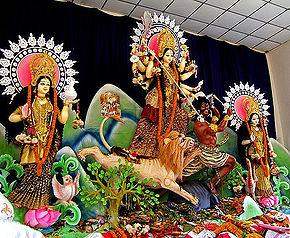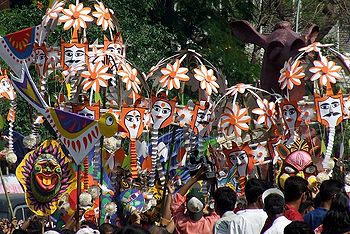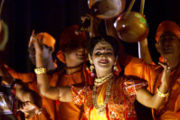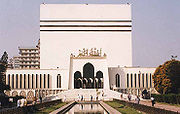
Secularism in Bangladesh
Encyclopedia

Bengali language
Bengali or Bangla is an eastern Indo-Aryan language. It is native to the region of eastern South Asia known as Bengal, which comprises present day Bangladesh, the Indian state of West Bengal, and parts of the Indian states of Tripura and Assam. It is written with the Bengali script...
, is one of the fundamental principles that drove the Bengali nationalist movement and subsequent Bangladesh Liberation War
Bangladesh Liberation War
The Bangladesh Liberation War was an armed conflict pitting East Pakistan and India against West Pakistan. The war resulted in the secession of East Pakistan, which became the independent nation of Bangladesh....
which led to the creation of Bangladesh
Bangladesh
Bangladesh , officially the People's Republic of Bangladesh is a sovereign state located in South Asia. It is bordered by India on all sides except for a small border with Burma to the far southeast and by the Bay of Bengal to the south...
, which had been founded as a democratic secular nation-state
Nation-state
The nation state is a state that self-identifies as deriving its political legitimacy from serving as a sovereign entity for a nation as a sovereign territorial unit. The state is a political and geopolitical entity; the nation is a cultural and/or ethnic entity...
. The term Secularity
Secularity
Secularity is the state of being separate from religion.For instance, eating and bathing may be regarded as examples of secular activities, because there may not be anything inherently religious about them...
had been induced into the original Constitution of Bangladesh
Constitution of Bangladesh
The Constitution of Bangladesh is the supreme law of Bangladesh. It declares Bangladesh as a secular democratic republic where sovereignty belongs to the people; and lays down the framework defining fundamental political principles of the state and spells out the fundamental rights of citizens...
in 1972 as one of the Four State Principles, the others being Democracy
Democracy
Democracy is generally defined as a form of government in which all adult citizens have an equal say in the decisions that affect their lives. Ideally, this includes equal participation in the proposal, development and passage of legislation into law...
, Nationalism
Nationalism
Nationalism is a political ideology that involves a strong identification of a group of individuals with a political entity defined in national terms, i.e. a nation. In the 'modernist' image of the nation, it is nationalism that creates national identity. There are various definitions for what...
and Socialism
Socialism
Socialism is an economic system characterized by social ownership of the means of production and cooperative management of the economy; or a political philosophy advocating such a system. "Social ownership" may refer to any one of, or a combination of, the following: cooperative enterprises,...
. After the dramatic assassination in 1975 of President Sheikh Mujibur Rahman
Sheikh Mujibur Rahman
Sheikh Mujibur Rahman was a Bengali nationalist politician and the founder of Bangladesh. He headed the Awami League, served as the first President of Bangladesh and later became its Prime Minister. He headed the Awami League, served as the first President of Bangladesh and later became its...
, the country's founder, secularism would be condemned by subsequent military regimes and be eventually removed from the constitution by President Ziaur Rahman
Ziaur Rahman
President Ziaur Rahman, Bir Uttam, was a Bangladeshi politician and general, who read the declaration of Independence of Bangladesh on March 26, 1971 on behalf of Sheikh Mujibur Rahman. He later became the seventh President of Bangladesh from 1977 until 1981...
in 1977 by replacing the word "Secularity" with "Absolutue trust and faith in the Almighty Allah shall be the basis of all actions".
The removal of secularism has been described by the country's largely secular establishment as a betrayal of Bengali nationalism
Bengali nationalism
Bengali nationalism is the political expression of ethno-national consciousness of the Bengali people, who inhabit the ethno-linguistic region of Bengal. The region's territory is divided between Bangladesh and the Indian state of West Bengal...
and also opposed to mainstream Bengali culture and society, both of which are seen as remarkably pluralist and progressive
Progressivism
Progressivism is an umbrella term for a political ideology advocating or favoring social, political, and economic reform or changes. Progressivism is often viewed by some conservatives, constitutionalists, and libertarians to be in opposition to conservative or reactionary ideologies.The...
. However, the Bangladesh Army
Bangladesh Army
The Bangladesh Army is the land forces branch and the largest of the three uniformed service of the Bangladesh Armed Forces. The primary mission of the Army is to provide necessary forces and capabilities in support of Bangladesh's security and defense strategies including defense of the nation's...
with its close ideological association of center-right and conservative political parties led by the Bangladesh Nationalist Party
Bangladesh Nationalist Party
The Bangladesh Nationalist Party , commonly referred to as the BNP, is the mainstream center-right political party in Bangladesh. BNP ruled Bangladesh total 18 years since her independence, the longest than any other party in Bangladesh...
, have professed the term Bangladeshi nationalism
Bangladeshi nationalism
Bangladeshi nationalism is a political ideology that glorifies and promotes the citizens of the People's Republic of Bangladesh as a distinctive cultural and political nation...
, to refer the country as an Islamic nation given that 89% of the population is Muslim.
In 2009, the newly elected Awami League government announced that it would re-introduce the original Four State Principles into the Permeable of the Constitution of Bangladesh. Although recognized by the United Nations as a "moderate Muslim democracy", Bangladesh's new foreign minister Dipu Moni
Dipu Moni
Dipu Moni is a Bangladeshi politician and diplomat and the current Minister of Foreign Affairs since 2009.-Early Political Career:Until now the principal focus of her work has been women's rights and entitlements, health legislation, health policy and management, health financing, strategic...
announced that the country would like to be viewed as, in her words, "a secular, not moderate Muslim, country". The announcements have been widely welcomed by a cross section of people including the country's outspoken media and civil society. Though it led to thousands to protest against it, particular Islamist groups.
History

Bengal
Bengal is a historical and geographical region in the northeast region of the Indian Subcontinent at the apex of the Bay of Bengal. Today, it is mainly divided between the sovereign land of People's Republic of Bangladesh and the Indian state of West Bengal, although some regions of the previous...
since ancient times. In fact, secularism in the region as a whole, is in many ways different from that of Western
Western world
The Western world, also known as the West and the Occident , is a term referring to the countries of Western Europe , the countries of the Americas, as well all countries of Northern and Central Europe, Australia and New Zealand...
versions that assert complete separation of church and state
Separation of church and state
The concept of the separation of church and state refers to the distance in the relationship between organized religion and the nation state....
. The ethos of secularism in South Asia is fundamentally the freedom of individuals to practice the faith he or she desires without being subject to any form of state or communal discrimination.
Ancient and medieval rulers, especially the Pala Empire
Pala Empire
The Pāla Empire was one of the major middle kingdoms of India existed from 750–1174 CE. It was ruled by a Buddhist dynasty from Bengal in the eastern region of the Indian subcontinent, all the rulers bearing names ending with the suffix Pala , which means protector. The Palas were often described...
and Nawabs of Bengal practiced secularism in making decisions of the court. Hindus and Muslims would have prominent leaders from each community assisting the rulers. When the British East India Company
British East India Company
The East India Company was an early English joint-stock company that was formed initially for pursuing trade with the East Indies, but that ended up trading mainly with the Indian subcontinent and China...
came in the 18th century, it instituted separate laws for Hindus, Muslims and Christians. In doing so they laid the foundation for a civil code which remains largely unchanged to date.

Divide and rule
In politics and sociology, divide and rule is a combination of political, military and economic strategy of gaining and maintaining power by breaking up larger concentrations of power into chunks that individually have less power than the one implementing the strategy...
. Bengali Hindus were seen as affluent, educated and were accepted in civil services. On the other hand, Bengali Muslims, especially those in East Bengal
East Bengal
East Bengal was the name used during two periods in the 20th century for a territory that roughly corresponded to the modern state of Bangladesh. Both instances involved a violent partition of Bengal....
were highly discriminated. Most East Bengali Muslims were peasants and were persecuted by Hindu zamindars supported by the British Raj
British Raj
British Raj was the British rule in the Indian subcontinent between 1858 and 1947; The term can also refer to the period of dominion...
. This had led to several religious movements across East Bengal such as the Faraizi movement
Faraizi movement
The Faraizi movement was founded by Haji Shariatullah by Bengali Muslims. After returning from Mecca after a 20 year hiatus Shariatullah, seeing the degraded Muslims of Bengal, called on them to give up un-Islamic practices and act upon their duties as Muslims...
aimed at resisting the British and the Hindu zamindari class.
In 1905, Nawab Sir Khwaja Salimullah, the Nawab of Dhaka, proposed the partition of Bengal
Partition of Bengal
Partition of Bengal may refer to the partition of the Bengal region during two separate occasions:*Partition of Bengal *Partition of Bengal...
on communal lines to establish a separate province for the suppressed majority of the region who live in East Bengal and were mostly Muslim. The British accepted the parition and a new province by the name of Eastern Bengal and Assam
Eastern Bengal and Assam
Eastern Bengal and Assam was a province of British India, constituted of the eastern portion of the erstwhile province of Bengal and the Chief Commissioner's province of Assam. The new province came into being on 16th October 1905, following a partition of Bengal. The Bengali Hindu people agitated...
was created. However the partition was annulled in 1911 due to resistance from the Swadeshi movement in West Bengal that demanded the unification of Bengal.
In 1947, Bengal would again be paritioned on communal lines with East Bengal (present day Bangladesh) joining Pakistan
Pakistan
Pakistan , officially the Islamic Republic of Pakistan is a sovereign state in South Asia. It has a coastline along the Arabian Sea and the Gulf of Oman in the south and is bordered by Afghanistan and Iran in the west, India in the east and China in the far northeast. In the north, Tajikistan...
and West Bengal
West Bengal
West Bengal is a state in the eastern region of India and is the nation's fourth-most populous. It is also the seventh-most populous sub-national entity in the world, with over 91 million inhabitants. A major agricultural producer, West Bengal is the sixth-largest contributor to India's GDP...
being part of India
India
India , officially the Republic of India , is a country in South Asia. It is the seventh-largest country by geographical area, the second-most populous country with over 1.2 billion people, and the most populous democracy in the world...
. After the establishment of Pakistan, Bengalis faced immense discrimination and economic suffering. This led to the unification of religious communities, that were once divided by the antagonism during the British Raj
British Raj
British Raj was the British rule in the Indian subcontinent between 1858 and 1947; The term can also refer to the period of dominion...
. The Bengali nationalist movement quickly geared momentum with the increasing cultural and linguistic nationalism that were inherently secular. The Bangladesh Liberation War
Bangladesh Liberation War
The Bangladesh Liberation War was an armed conflict pitting East Pakistan and India against West Pakistan. The war resulted in the secession of East Pakistan, which became the independent nation of Bangladesh....
would see Bengalis, irrespective of religion join the fight for their freedom.

Nationalism
Nationalism is a political ideology that involves a strong identification of a group of individuals with a political entity defined in national terms, i.e. a nation. In the 'modernist' image of the nation, it is nationalism that creates national identity. There are various definitions for what...
, Democracy
Democracy
Democracy is generally defined as a form of government in which all adult citizens have an equal say in the decisions that affect their lives. Ideally, this includes equal participation in the proposal, development and passage of legislation into law...
, Secularism
Secularism
Secularism is the principle of separation between government institutions and the persons mandated to represent the State from religious institutions and religious dignitaries...
and Socialism
Socialism
Socialism is an economic system characterized by social ownership of the means of production and cooperative management of the economy; or a political philosophy advocating such a system. "Social ownership" may refer to any one of, or a combination of, the following: cooperative enterprises,...
. In 1975, Sheikh Mujibur Rahman
Sheikh Mujibur Rahman
Sheikh Mujibur Rahman was a Bengali nationalist politician and the founder of Bangladesh. He headed the Awami League, served as the first President of Bangladesh and later became its Prime Minister. He headed the Awami League, served as the first President of Bangladesh and later became its...
, the country's founding father was assassinated by junior officers in the military and martial law was declared. The new President Khondaker Mostaq Ahmad
Khondaker Mostaq Ahmad
Khondaker Moshtaq Ahmad was a Bangladeshi politician who served as the President of Bangladesh from 15 August to 6 November 1975 after the assassination of Sheikh Mujibur Rahman, the founding leader of Bangladesh...
would even proclaim in his maiden radio address, that the country he now heads is the "Islamic Republic of Bangladesh". Mostaq Ahmed would eventually be removed by counter coups in the volatile situation and army chief and liberation war hero Lt. Gen Ziaur Rahman
Ziaur Rahman
President Ziaur Rahman, Bir Uttam, was a Bangladeshi politician and general, who read the declaration of Independence of Bangladesh on March 26, 1971 on behalf of Sheikh Mujibur Rahman. He later became the seventh President of Bangladesh from 1977 until 1981...
would take over as president.
After Zia assumed the presidency, he would ally with his one time enemies during the liberation war, the anti liberation leaders such as Shah Azizur Rahman
Shah Azizur Rahman
Shah Azizur Rahman was a Bangladeshi politician who served as the Prime Minister of Bangladesh. However, he was the subject of considerable controversy for his collaboration with the Pakistan Army against the struggle to establish Bangladesh....
, Sabur Khan and Kazi Abdul Kader. The decision to ally with anti liberation leaders was seen as necessary as part of political strategy in order to counter the Awami League of the assassinated Sheikh Mujibur Rahman. Although Zia was incredibly popular for bringing stability after the volatility after 1975, he began using religion as a major factor in politics. He formed the Bangladesh Nationalist Party
Bangladesh Nationalist Party
The Bangladesh Nationalist Party , commonly referred to as the BNP, is the mainstream center-right political party in Bangladesh. BNP ruled Bangladesh total 18 years since her independence, the longest than any other party in Bangladesh...
that professed the more Islamic "Bangladeshi nationalism" to replace the secular Bengali nationalism
Bengali nationalism
Bengali nationalism is the political expression of ethno-national consciousness of the Bengali people, who inhabit the ethno-linguistic region of Bengal. The region's territory is divided between Bangladesh and the Indian state of West Bengal...
. The Bangladesh parliament in 1977 amended the constitution by changing the Four State Principles. The amendment caused the term "Secularism
Secularism
Secularism is the principle of separation between government institutions and the persons mandated to represent the State from religious institutions and religious dignitaries...
" in the Permeable to be replaced with "Absolutue trust and faith in the Almighty Allah shall be the basis of all actions".
Finally in 1988, the country's second military ruler Hussain Muhammad Ershad declared Islam as the state religion
State religion
A state religion is a religious body or creed officially endorsed by the state...
in Bangladesh. This would be the final blow to constitutional secularism in the country. Supporters of the BNP and the military would engage in various anti minority activities particularly against the Hindu and tribal communities of the country.
However after the return to democracy in 1991, there have been growing calls by the country's "pro liberation forces", the largely secular civil society and freedom fighters, as well as from the young generation to re introduce secularism back into the constitution. In 2009, the Awami League government announced that it would amend the constitution and induce the original Four State Principles.
Controversies
Secularism is a hugely controversial issue in Bangladesh, with the country's politics effectively divided between secularist and leftists forces and conservative and Islamist forces. Islamic fundamentalist parties have often termed the propagators of secularism as being "anti-Islam" and accused them of promoting blasphemy by terming Bangladesh a secular nation. For example, various speeches made by leaders of the leading religious party, the Jamaat-e-Islami Bangladesh, have said that the Muslim headscarfHeadscarf
Headscarves or head scarves are scarves covering most or all of the top of a woman's hair and her head. Headscarves may be worn for a variety of purposes, such as for warmth, for sanitation, for fashion or social distinction; with religious significance, to hide baldness, out of modesty, or other...
would be banned if the Awami League were to be allowed to put back secularism in the constitution. In 2008, when the military-backed caretaker government passed a landmark National Women Policy, the government came under criticism from Islamic fundamentalists for drafting what they termed as an "anti-Islamic" policy. Subsequently following street protests by religious bigots and pressure from sections of the military, the government was forced to review the policy.
The Awami League, the mainstream secular party which was also instrumental in the war of liberation, has been accused of failing to define secularism to the common masses and also for being inconsistent in their loyalty to the secularist ideology. In 1996 the party had allied unofficially with Jamaat to strengthen opposition against the then BNP government. In 2006, the party was widely criticised for welcoming the ultra-radical Bangladesh Khelafat Andolon, a party that preaches Islamic Shariah law be introduced in Bangladesh, into the Grand Alliance, the coalition of opposition parties led by the Awami League. What was more controversial is an agreement signed with the Khelafat Andolan that in the event of the Grand Alliance assuming power, no "anti-Islam
Islam
Islam . The most common are and . : Arabic pronunciation varies regionally. The first vowel ranges from ~~. The second vowel ranges from ~~~...
", "anti-Quran" or "anti-Sunnah
Sunnah
The word literally means a clear, well trodden, busy and plain surfaced road. In the discussion of the sources of religion, Sunnah denotes the practice of Prophet Muhammad that he taught and practically instituted as a teacher of the sharī‘ah and the best exemplar...
" laws would be passed. The Khelafat Andolon was eventually dropped from the Grand Alliance after the widespread criticism of the Awami League.
The Bangladesh Nationalist Party
Bangladesh Nationalist Party
The Bangladesh Nationalist Party , commonly referred to as the BNP, is the mainstream center-right political party in Bangladesh. BNP ruled Bangladesh total 18 years since her independence, the longest than any other party in Bangladesh...
, although containing a significant number of freedom fighters, has declared "Islam to the fundamental way of life" in its party constitution and is often seen making similar claims like their alliance partner Jamaat against the Awami League. However the party has largely remained silent on whether they would support secularism being put back into the constitution. "Pro-liberation" leaders within the party have also been calling for it to end its alliance with the fundamentalist Jamaat that opposed the liberation of Bangladesh. Many within the party have expressed concern at the growing proximity of some leaders within the party itself, who have been alleged to be prominent razakars (those who collaborated with the Pakistan Army
Pakistan Army
The Pakistan Army is the branch of the Pakistani Armed Forces responsible for land-based military operations. The Pakistan Army came into existence after the Partition of India and the resulting independence of Pakistan in 1947. It is currently headed by General Ashfaq Parvez Kayani. The Pakistan...
in 1971), to the party Chairperson Begum Khaleda Zia. Amongst these controversial leaders, Salahuddin Quader Chowdhury, against whom there is video footage of taking part in the killing of hundreds of Hindus in Chittagong
Chittagong
Chittagong ) is a city in southeastern Bangladesh and the capital of an eponymous district and division. Built on the banks of the Karnaphuli River, the city is home to Bangladesh's busiest seaport and has a population of over 4.5 million, making it the second largest city in the country.A trading...
, is the most controversial. The party is also widely viewed as "anti-India" and "pro-Pakistan" in its approach to engaging on the international stage, although the party constitution advocates a neutral and nationalistic foreign policy.
See also
- Religion in BangladeshReligion in BangladeshIslam is the largest religion of Bangladesh; Muslims constitute 89.5 % of the population followed by Hindus who constitute 9.6 %. The remainder of Bangladeshis practice other religions such as Buddhism and Christianity. Religion has always been a strong part of identity, but this has varied at...
- Constitution of BangladeshConstitution of BangladeshThe Constitution of Bangladesh is the supreme law of Bangladesh. It declares Bangladesh as a secular democratic republic where sovereignty belongs to the people; and lays down the framework defining fundamental political principles of the state and spells out the fundamental rights of citizens...
- Islam in BangladeshIslam in BangladeshIslam is the largest religion of Bangladesh, the Muslim population is approximately 148.6 million, which is the third largest Muslim population in the world, constituting 90.4% of the total population as of 2010. Religion has always been a strong part of identity, but this has varied at different...
- Hinduism in BangladeshHinduism in BangladeshHinduism is the second largest religious affiliation in Bangladesh, covering more than 9.2% of the population, according to the Bangladesh Bureau of Statistics...
- Buddhism in BangladeshBuddhism in BangladeshBuddhism is the third largest religion in Bangladesh with about 0.7% of population adhering to Theravada Buddhism. Most of the practiconers are the tribal Jumma people who are found mainly in the Chittagong Hill Tracts, where they constitute about 45% of the area's population.- Demographic Overview...
- Christianity in BangladeshChristianity in BangladeshChristianity arrived in what is now Bangladesh during the late sixteenth to early seventeenth century AD, through the Portuguese traders and missionaries. Christians account for approximately 0.3% of the total population. Christianity's first contact with the Indian subcontinent is attributed to...
- Bengali nationalismBengali nationalismBengali nationalism is the political expression of ethno-national consciousness of the Bengali people, who inhabit the ethno-linguistic region of Bengal. The region's territory is divided between Bangladesh and the Indian state of West Bengal...
- Politics of BangladeshPolitics of BangladeshPolitics of Bangladesh takes place in a framework of a parliamentary representative democratic republic, whereby the Prime Minister of Bangladesh is the head of government, and of a multi-party system. Executive power is exercised by the government. Legislative power is vested in both the...
- Culture of BangladeshCulture of BangladeshBangladesh has a long history in its culture. The land, the rivers, and the lives of the common people formed a rich heritage with marked differences from neighbouring regions. It has evolved over the centuries and encompasses the cultural diversity of several social groups of Bangladesh...

